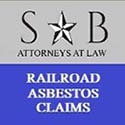
Asbestos is a toxic material that was heavily used in the railroad industry all the way into the 1980s. Specifically, asbestos was used to insulate materials on steam locomotives and diesel locomotives. This included boilers, the outside of the train’s engine, under the metal body of the train, in boxcars, ceilings of cabooses, pipe coverings, electrical panels, and the driving cabins and carriages.
Those who were employed by a railroad company prior to 1982 are at high-risk for developing asbestos-related illness as a result of their time working around this dangerous material. The issue is that microscopic fibers would become airborne, making them easy to inhale or ingest. Once asbestos fibers work their way into the body, they can easily become trapped, permanently embedding into soft tissue. This can lead to genetic mutations and permanent scarring.
Money is available for railroad workers that have been exposed to asbestos and have since developed health problems. This can even include shortness of breath or internal scarring that you may not be aware of. Our attorneys work with those who were employed by the railroad industry to recover the money they deserve.
Asbestos Effects on Health
Since the mid-1900’s, many studies have been performed to determine the possible health effects associated with exposure to asbestos fibers. The results of these studies have indicated that high levels of exposure to airborne asbestos fibers may cause a variety of pulmonary (involving the lungs and breathing) diseases.
The most notable of the diseases associated with asbestos is Asbestosis. Asbestosis is the scarring of the tissues of the lungs (including the alveoli, tiny air sacs where the primary exchange of oxygen occurs between the air and blood) which causes a reduction in lung capacity. The relationship between the development of Asbestosis and exposure to airborne asbestos is dose-related. The greater the asbestos exposure, the greater the likelihood of developing Asbestosis.
Although Asbestosis has been positively linked to asbestos exposure, it may be years after the exposure before disease develops. In fact, Asbestosis typically has a latency period of 15-30 years after exposure.
Other asbestos-related respiratory diseases include Mesothelioma, pleural (the body cavity that surrounds the lungs) abnormalities and lung cancer. Studies have also shown exposure to airborne asbestos fibers may cause cancer of the esophagus, colon, pancreas, and stomach.
Free Asbestos Exposure Consultation Charlotte, NC
At Sammons & Berry, P.C. we offer a no-cost, no-obligation consultation, so you can discuss the facts of your case without paying for anything upfront. Asbestos trusts claims do not require a lawsuit, depositions, or courtrooms. The process is simple and easy for the client and should not require any stressful legal confrontations for the client. The law firm handles all of the claims for the client, helping you maximize your compensation. We do not accept any payments from our clients until they receive compensation. We charge on a contingent fee basis, which means you pay a percentage of what you get paid in your claim. If we are unable to collect anything for you, there is no cost to you.
Call (800) 519-1440 to speak with a Sammons and Berry, P.C. representative and start your journey towards compensation.
Wrongful Death Claims For Families of Asbestos Victims
If you have lost someone in your family due to the harmful exposure of asbestos, you may be entitled to compensation. If you can provide the work history and a death certificate for your loved one, our attorneys can help you file an asbestos claim. We understand how difficult this process can be, this is why we work with you every step of the way to help you get the money you deserve. Reach out to our team today to learn more about filing a claim for a family member.
See if you qualify for compensation
Sammons & Berry, P.C.
800-519-1440
Google Listing
Facebook


